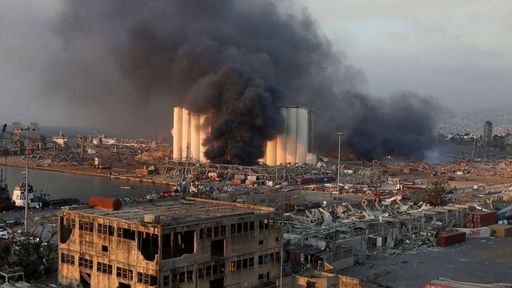On cargo, a tragedy and murky business dealings - Maximilian Popp, Christoph Reuter und Fritz Schaap in Der Spiegel:
'In September 2013, eight Ukrainians and a Russian departed Georgia on a beat-up freighter, apparently heading for Mozambique. Their ship was already in bad shape before it even left the Black Sea port of Batumi. Called the Rhosus, the vessel was leaking, its alarm system was faulty and so was its rescue equipment.
But the cargo on board was extremely volatile: 2,750 tons of ammonium nitrate in a highly concentrated variant, the kind used to make explosives, with a nitrogen enrichment level of almost 35 percent. Seven years later, on August 4, 2020, it would devastate parts of Lebanon's capital city Beirut, killing around 200 people and injuring thousands.
Since then, the world has taken an interest in the Rhosus and its history, with investigators trying to piece together the details of its final voyage. How did the Rhosus end up in Beirut? And who had really ordered the explosive chemicals?
Thus far, the story has been that the ship belonged to a Russian man named Igor Grechushkin. The cargo was reportedly destined for a company called Fábrica de Explosivos de Moçambique, or FEM for short, a Mozambican explosives manufacturer.
But joint reporting conducted by DER SPIEGEL and the journalism network called the Organized Crime and Corruption Reporting Project (OCCRP) has now raised doubts about that narrative. The reporting has found that it was not Russian national Grechushkin who owned the Rhosus, but rather the Cypriot businessman Charalambos Manoli, who maintained a relationship with the bank used by Hezbollah in Lebanon. And a considerable amount of the ammonium nitrate stored in the port of Beirut appears to have gone missing before the explosion in August.'
(...)
'In contrast to Grechushkin, the Russian who chartered the vessel, Manoli did have business relations in Lebanon. Court records show that Manoli took out a loan back in 2011 for $4 million from the Tanzanian FBME Bank to finance the purchase of another ship, the Sakhalin.
FBME isn’t just any bank. American investigators have accused the institution of acting as a money launderer for Hezbollah. Another of the bank’s customers was a suspected Syrian front company that had been involved in the country’s chemical weapons program. It was to this bank that Manoli owed money.
Seized Holdings
Only one month after he received the loan, Manoli’s company Seaforce Marine Limited, based in Belize in Central America, defaulted on the first installment. Manoli had offered the Rhosus as collateral, but FBME suspected that the shipowner wanted to sell the vessel and seized Manoli’s real estate holdings in Cyprus.
Internal FBME documents show that Manoli still owed the bank 962,000 euros in outstanding debt in October 2014. Manoli denies any connection between his debts and the fact that the freighter was stopped in Beirut. However, one investigator notes that FBME is notorious for pressuring defaulting borrowers into doing favors for dubious customers like Hezbollah.'
(...)
'Ultimately, the ammonium nitrate was an abandoned freight: No one admitted to having paid for it and no one tried to recover it.
In the end, the highly explosive chemicals were stored for six years in Hall 12 at the Port of Beirut. The authorities, particularly customs officials, warned repeatedly that the ammonium nitrate needed to be removed from the port. But the petitions were sent to the wrong court so persistently that it is difficult for lawyers involved to believe in mere incompetence. Is it possible that the intent was for the ammonium nitrate to remain in Hall 12?
Another inspection of the cargo in spring 2020, this time by the Lebanese state security, raised doubts as to whether all 2,750 tons of the ammonium nitrate were still there. One of the warehouse’s gates was missing and there was a large hole in the south wall, they warned. "If a theft were to occur, the perpetrators could use these goods as explosives." But the state security officials apparently didn’t count or measure the exact amount of ammonium nitrate that was still left in the warehouse at the time.
Their warning that the warehouse needed to be secured didn’t reach Lebanon’s prosecutor general until June. In mid-July, state security also sent the report to the president and the prime minister. But no action was taken.
It’s still unclear today how much ammonium nitrate was detonated in the August 4 explosion. European intelligence officials involved in the investigation assume it was between 700 and 1,000 tons.
But where did the rest, the much larger quantity of the explosive chemicals, go? That’s one of the many questions investigators will now need to answer.'
Read the complete article here.
The question, where did approximately 2000 tons of ammonium nitrate go to, will never be answered, I'm afraid.
See also the investigation of the murder of Hariri.
Nor will the tragedy force the almost failed Lebanese state to become a less failed state. Too many actors make a living out of the failed state Lebanon, not in the last places the families in Lebanon that form a shadow state. The interest in prolonging the status quo is just too big.
But those who can leave Lebanon will leave, and will leave with more urgency than before.
